

Sarah Mercer - ELT Research and Methodology. I am a member of the following professional organisations: AAAL, BAAL, IAPLL, IATEFL, ILASP, ÖGSD, TESOL & VERBAL.
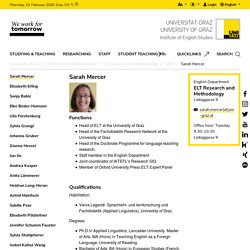
How NOT to give a conference presentation – Laura Patsko. Continuing my series of posts on the ‘best bits’ of my IATEFL 2013 Conference experience, I feel compelled today to turn the tables and report on a presentation I attended today that taught me a lot–not about the intended subject matter, unfortunately, but about things that make or break a conference presentation (in–and I stress–my personal opinion).

I won’t name names, and I should specify now that, as an ELT professional with little-to-no presenting experience myself, I don’t mean to demean or undermine in any way the courage and professional wherewithal it takes to stand up and present at an international conference. However, I do have a fair amount of experience as a conference audience member, and from that point of view, here are my recommendations to presenters for a well-received talk: DON’T: talk so fast that no one can follow you.
If you know you’re a fast talker, practise slowing down (I can empathise with the difficulty of this!). Conferences are good for professional development. As I reflect on how much I enjoyed this year’s IATEFL conference in Manchester, I find myself thinking about the value of conferences for professional development.
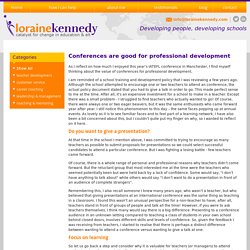
I am reminded of a school training and development policy that I was reviewing a few years ago. Although the school attempted to encourage one or two teachers to attend an conference, the actual policy document stated that you had to give a talk in order to go. This made perfect sense to me at the time. After all, it’s an expensive investment for a school to make in a teacher. Textploitation. So, this was a session that I did with some teachers at our school, EC, a few years back, it got great feedback at the time and I am constantly pleased to see that some of the ideas from it are still being used in our classrooms today.

If you have used many of the writing materials posted on the site you will probably recognise some of the ideas if not actual full exercises here. The idea of the CPD was to try to get teachers thinking about teaching writing, and what that involves rather than just setting writing. There is an accompanying booklet that goes with the CPD as I don’t think there is much point in giving teachers ideas without giving them a helping hand to put them into practice.
They are busy and often won’t have time to plan a lesson using the new ideas so anything that can be done to make it easier for them to implement ideas is a good thing in my book. The procedure below is just a talk through the power point which you can download below. Blog Archive » Andy Hockley's Six Ways to Survive the Crisis through Professional Development. I met Andy Hockley through Twitter and he has become an important member of my PLN (Personal Learning Network).
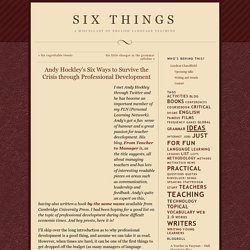
Andy’s got a fun sense of humour and a great passion for teacher development. His blog, From Teacher to Manager is, as the title suggests, all about managing teachers and has lots of interesting readable pieces on areas such as communication, leadership and feedback. Andy’s quite an expert on this, having also written a book by the same name available from Cambridge University Press. I had been hoping for a good list on the topic of professional development during these difficult economic times. And hey presto, here it is! Ed Tech Fitness – Feel Better, Teach Better. Education & Training Conferences, Educational Seminars, Summits & Popular Forums & Meetings in 2018/2019. 13 Ways That Expert and Novice Teachers Think Differently.
An age old question still lacks an answer: what makes a good teacher good and a bad teacher bad?
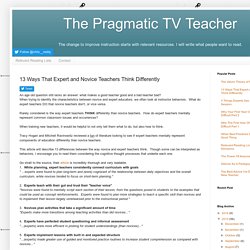
When trying to identify the characteristics between novice and expert educators, we often look at instructor behaviors. What do expert teachers DO that novice teachers don't, or vice versa. Rarely considered is the way expert teachers THINK differently than novice teachers. How do expert teachers mentally represent common classroom issues and occurrences? When training new teachers, it would be helpful to not only tell them what to do, but also how to think. Ozge Karaoglu's Blog - About apps and web tools, and being a teacher … TESOL Resource Center. Welcome to the TESOL Resource Center!

Need a lesson plan? An activity? How about ideas for what to do in class tomorrow morning? Well, you've come to the right place. The TESOL Resource Center contains lesson plans, teaching tips, activities, assessment tools, and much more. Verb Cards for Interactive Practice. The Principles. QR codes: A treasure hunt. Here’s another classroom idea for using mobile devices and QR codes.
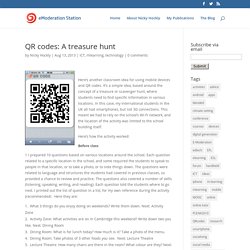
It’s a simple idea, based around the concept of a treasure or scavenger hunt, where students need to find specific information in various locations. In this case, my international students in the UK all had smartphones, but not 3G connections. This meant we had to rely on the school’s Wi-Fi network, and the location of the activity was limited to the school building itself. Here’s how the activity worked: Tools, tips, techniques and tweets for online moderators... K-12 & Higher Ed. Media Literacy Lesson Plans. DIGPA - The Amazing World of Teaching. TTT Sample Lesson Plan – Side Notes on ELT. ANDREWARTICLESANDSTORIES. My last three books are about telling and making stories in the language classroom Storytelling with Children.
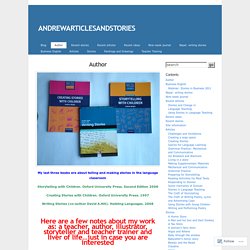
Oxford University Press. Second Edition 2008 Creating Stories with Children. Oxford University Press. 1997. Teacher development, teacher training and whole person learning, teacher training courses such as CELTA and DELTA and news from ITI's global community. Ken Wilson's Blog – Still Standing – Careering Into My Seventies. Supporting you every step of the way. Web Tools – Professional development unit. Interviews – JJ Amaworo Wilson, author. *Silver City Daily Press *Electric Lit *Words on a Wire, hosted by Daniel Chacón and Tim Hernandez *Blog talk radio, hosted by Cyrus Webb *WebbWeaver Books.
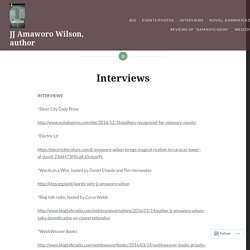
Upcoming webinars for ELT educators. Here’s a round-up of webinars scheduled over the next two months. I’ve been told that I neglect webinars provided by North American platforms although I’ve always included ones from Tutela – I’m going to try to cast my net a bit more widely but do let me know if I’ve missed any. Academic skills Bottoms up! Videos for ESL Teachers – Professor Jack C. Richards. Review of MyCPD digital tracker. Lessonstream.org by Jamie Keddie Home. 4C in ELT TYSON SEBURN. By Jamie Keddie The eye of the bucket. This video was created by John Wells from the Southwest Texas Alternative Energy and Sustainable Living Field Laboratory (website here). John created the video by placing a GoPro camera at the bottom of a bucket of water. This Videotelling activity makes use of a story which I have based on the video narrative. Language level: B1+Learner type: Young learners; Teens; AdultsTime: 45 minutesActivity: A Videotelling activityTopic: Water & thirstLanguage: Past perfect continuousMaterials: Video & text The story John lives in Southwest Texas He has a little house in middle of the desert Although he lives alone, he has many friends and visitors.
An ELT Notebook: Giving and Checking Instructions. Some of the activities that we use in the classroom are fairly complex in terms of the way they’re organised, and I doubt if there are many teachers who can honestly claim that they’ve never got a class totally confused by the way they’ve given instructions. How can you make sure that your instructions are as clear and comprehensible as possible? Here are some guidelines : Plan how you’re going to give the instructions before you go into the classroom, and make sure that you can explain them within the limits of the language which the students can understand. 8 Ways to Supercharge Google Docs with Drawings.
On the 8th day of Tech-Mas my true love gave to me… 8 Docs Drawings. Note: This post is part of my "12 Days of Tech-Mas" series for 2017. You can see all of the posts for each day as they get released in the main post here: "12 Days of Tech-Mas 2017". "You can't do that in Google Docs! " If you have ever made that claim, then you know the frustration of loving all the awesome things you can do in Docs, but still bumping up against limitations.
Sometimes we can extend the capabilities of Docs by installing add-ons or extensions. That tool ... How to Stop Killing the Love of Reading. English Grammar: KIND OF VOWELS – MONOPHTHONG & DIPHTHONG. Business English, Legal English, English for Academic Purposes, etc. - English for Specific Purposes World. Volume 7, Issue 3. Goals and Techniques for Teaching Reading.
Instructors want to produce students who, even if they do not have complete control of the grammar or an extensive lexicon, can fend for themselves in communication situations. In the case of reading, this means producing students who can use reading strategies to maximize their comprehension of text, identify relevant and non-relevant information, and tolerate less than word-by-word comprehension. Focus: The Reading Process To accomplish this goal, instructors focus on the process of reading rather than on its product. Aching For Schools. Glasgow Excursion Blog: IATEFL 2017 – This is the blog of the ELT Research and Methodology Graz excursion to the 2017 IATEFL conference in Glasgow.
Contacts - David Heathfield. Books - 7 Habits of Highly Effective People - Habit 2: Begin with the End in Mind. So, what do you want to be when you grow up? A discussion about re-inventing our profession. How to get a distinction in your Delta module 2 Background Essays. I suppose the title could be considered clickbait, but the idea is to try to help you to do well during Delta module 2. I got a distinction in my first three Background Essays, and imagine LSA4 (which is externally assessed) was up to the same standard. You can do it too, and I think the following tips and reading suggestions will help. Teacher, Trainer, Materials Developer. 100 Things You Can Do To Improve Your English - Langports.
* Motivation 1. An article by Dörnyei and Csizer (1999) “Ten commandments for motivating language learners: results of an empirical study” in the LTR journal ( (see the Articles section of this website for a copy) predates all Dörnyei’s more recent work, where he develops an “integrated theory” of motivation (see, for example, Dörnyei, Z., & Ushioda, E. (2011). Teaching and researching motivation (2nd ed.). Non-Verbal Signals. Types of questions. The importance of teaching reading: Teaching reading in the English language course should include the following set of learning goals: Dinosaurs in Education – Language Teaching Tips. English Language Arts & Reading – Vision in Practice. Presentations & Multimedia. 12 Tips for training older teachers to use technology – Resources for English Language Learners and Teachers.
3 Ways to Be Less Boring. [FREE WEBINAR] How to Differentiate Instruction with Technology. The Office Hour. Teaching, Teacher Education, New Technologies. Useful links for CELTA. Teachwithict - connectED challenge. INFOGRAPHIC: How the World Reads – Electric Literature. ETp home. Edutopia. CristinaSkyBox. Making the right choices: ‘Lean On Me’ – On the same page.
Writing and Public Speaking - 9 Great Speaking & Listening Tools For Students: Literacy in the Digital Age. Top 36 Educational Podcasts for Teachers. Stimulated Recall. Teacher Karma: QR Codes ~ How to Make It Happen in Your Classroom. Bee Activity Books. Elteachertrainer – The website and blog of ELT author John Hughes with news, links and information about his books, articles and presentations. About - Teacher Feedback.ORG. Nik Peachey. Language Teacher Toolkit: Second language learning and acquisition. Get Spring, Don't Let Spring Get You - Stress Relief 4 Teachers. Resources - All Things EdTech. Upcoming Web Events - EdchatInteractive. Webinars. ELT Calendar of Conferences on Second Language Teaching and Second Language Acquisition in Japan. ELT CONFERENCES 2015. Professional Development for ESL Teachers. Pathbrite - Beril Ayman Yücel's Profile. More Than Just A Story – An Interview with Dinçer Demir. Teaching resources.
Eğitimde Teknoloji Kullanımı, Eğitim Teknolojileri #egitimdeteknoloji. 40th ELT Blog Carnival:Ideas for Teaching with Technology. A little blog of my favourite classroom activities. Being A Teacher - Lead, Inspire, Innovate. 50 Inspiring TED Talks For Teachers: An Updated List For 2014. Difficult students. Using Hexagon Learning for categorisation, linkage and prioritisation.
Personalized vs. differentiated vs. individualized learning. Cuisenaire Rods. Useful links for CELTA. Myths in Education, or How Bad Teaching Is Encouraged. Classroom Activities for 1:1 & BYOT. Educational Technology and Mobile Learning: flipped classroom. 100 Teaching Tips - An interview with Penny Ur, Part 1. About » Equipping ourselves because we love our learners! Six Things. What I Know For Sure About Learning.